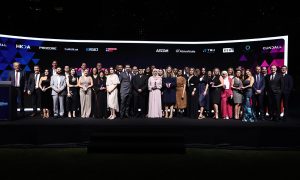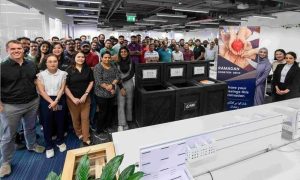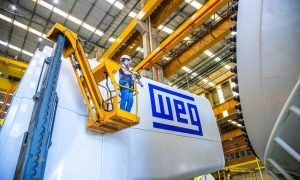Women in Construction: Ted Jacob Engineering Group’s Gabriela Soto
“People still get surprised when a woman starts talking and she shows her accurate technical and business knowledge”

“People still get surprised when a woman starts talking and she shows her accurate technical and business knowledge, especially if you have not been introduced. If there’s a group of people that come to a boardroom together, the women are expected to be the ones taking notes and not chairing the meeting. You can never generalise, but this has been common in my career.”
As part of the Women in Construction series, Ted Jacob Engineering Group’s Gabriela Soto talks to Jason Saundalkar about her influences, career and gender diversity in the construction industry
What drove you to get into construction and your very first role in the industry? What were some of the influences that set you on your path?
I’ve always been fascinated by building work and the heights of what engineering can achieve. I chose Civil Engineering as my degree and the people that have most inspired me have always been women who were hardworking and didn’t let anyone put them down.
Please share with us a brief description of your career and your key achievements.
My first job was on-site during the construction of one of the biggest airports in the north of Mexico. From the beginning, I was convinced that I wanted to be part of iconic projects and especially those that contribute to the development of countries. When I was offered a job in the UAE, I didn’t think twice. I was eager and excited to come and see the place that was making the biggest construction dreams come to life. I remember I made the guy that hired me promise that he would pay for my flight back if I didn’t like it within three months… eight years later I don’t have any plans of leaving anytime soon.
My work in Dubai started in construction sites, which was surreal. I was ecstatic to be in these super high-rise buildings and being part of this fast-growing country. When I started at TJEG almost five years ago, I was managing projects and operations. I’m now part of the management team and dealing with the commercial side of the business.
What would you say is your proudest moment in the industry?
I am proud of where I am; I can’t think of only one proud moment. I am proud of every step I’ve taken during my career path, even when I’ve missed out, as it taught me how to succeed in the next challenge. It’s important to define yourself by your work; I am focused on delivering quality projects in all aspects, specifically in responding to the client’s vision, as well as creating a unique journey for end users through designs that respect the society, culture and the environmental conditions.
It’s important to be honest and responsible; gaining the trust of the people you are working with is key for me. It facilitates communication with the client, enhances the team’s work spirit and creates a healthy environment between all parties.
Besides fairness and being the right thing to do, diversity in the construction industry is important because of the value women can bring to employers, clients and customers. How have you made your mark in the industry working on specific projects? What is your proudest moment?
I believe the most important thing is commitment. I want people to know they can trust me and that if I say I’ll do something, it’ll be done. However, you do have to be very organised with your deadlines and be aware of your workload before making such commitments. I find that it is generally more difficult for women to say no.
My proudest moments are when achieving goals. I graduated top of my class when I did my master’s degree in a year while still working full-time. There are enough hours in the day when you really want to achieve something.
What are some of the barriers to women entering the construction industry? What was your personal experience?
When I started on-site, people thought it was too tough for a woman and were expecting me to quit. I now think back and believe some of my colleagues were trying to make it even more difficult, so I would give up faster and they would ‘be right’. It has always taken a few months to prove myself in a new project and for people to trust me. Following that period, I was then very happy working on that site.
The GCC construction sector is still male-dominated, but diversity is beginning to increase. If you agree, comment on what is driving this and how you see the GCC markets changing in the coming years. If you do not , please share your view of the market.
I am always thrilled to hear that there’s a woman running a construction site or a company, or that a woman is respected for her technical and business knowledge.
It is true that I still go to events and people suppose that I’m there as a spouse, but that is decreasing. I also see that people think ladies in construction are ‘tough women’, and I disagree with that. Younger generations need to grow up knowing that you can work in construction (or anywhere) without having to put a game face on.
Everyone has a part to play in diversity and equal pay. What would you like to see government authorities and construction firms do to increase diversity and make pay a level playing field?
I think we get it wrong when we say that there have to be as many women as men in a business/project/market. There should only be as many as there are qualified and capable individuals. Companies can, however, celebrate inclusion – this way, kids won’t have to choose a woman’s or man’s job for fear they won’t be able to work in the industry they feel is their passion.
Besides authorities and construction firms, who else can play a part in increasing diversity and balancing pay scales?
Every individual can play a part. Men and women, we all have women in our lives who we love and respect.
This goes way beyond the GCC and construction, but we must change our perception that the man makes the money. The money is made by whomever chooses to work.
As a woman in the industry, what has your experience been working in the GCC construction sector? If you have worked in markets outside the GCC, how does your experience here compare with what you’ve experienced and observed in other markets?
People still get surprised when a woman starts talking and she shows her accurate technical and business knowledge, especially if you have not been introduced. If there’s a group of people that come to a boardroom together, the women are expected to be the ones taking notes and not chairing the meeting. You can never generalise, but this has been common in my career.
What I love the most about being a woman working in the GCC is the utter respect that most men have for women.
In your opinion, what is the biggest challenge women in the construction sector face in GCC countries? How can it be addressed?
Believing in oneself so you can transfer that belief to others. You must show what you know and prove your worth, but for that you first have to believe in yourself.
This is challenging when you’re in an industry where some people believe you don’t belong. One of the reasons I chose engineering was because people were saying I shouldn’t do it. I went through it stubbornly, and now I am very happy I did.
In doing your job, what sort of discrimination (if any) have you faced and how did you/employer address it?
I’ve never been in a situation where I felt looked down on because of being a woman.
What I have encountered is that some people don’t want to work with younger engineers, they want to see grey hair – again, it’s a matter of proving your capabilities, but this is more difficult if you look young.
How do you personally push for diversity and equal pay in the construction sector? Are you involved in any groups/councils etc. that focus on increasing diversity and equal pay?
I’m not involved in specific groups, but most of my friends in the UAE work in construction. We help each other, share experiences, and we become better at our jobs and within our organisations due to our connections.
I do believe women in the business support each other’s growth.
What advice would you give to a woman entering the GCC construction industry today?
Be sure of what you’re worth, don’t let anyone tell you that you can’t do it – and if they do, prove them wrong. You’ll only go as far as you let yourself.
To support the drive towards gender balance in the industry, Middle East Consultant and meconstructionnews.com are highlighting female construction professionals in a series of profiles. By telling their stories and sharing their experiences on our print and digital platforms, we hope to inspire more women to join this vibrant industry.



















